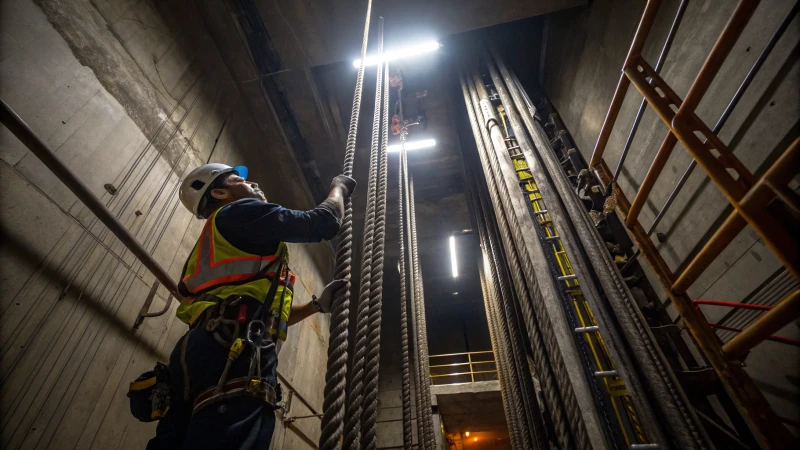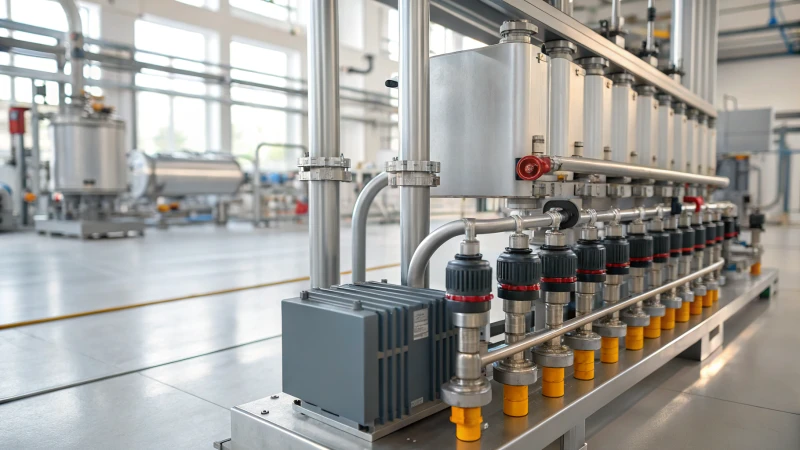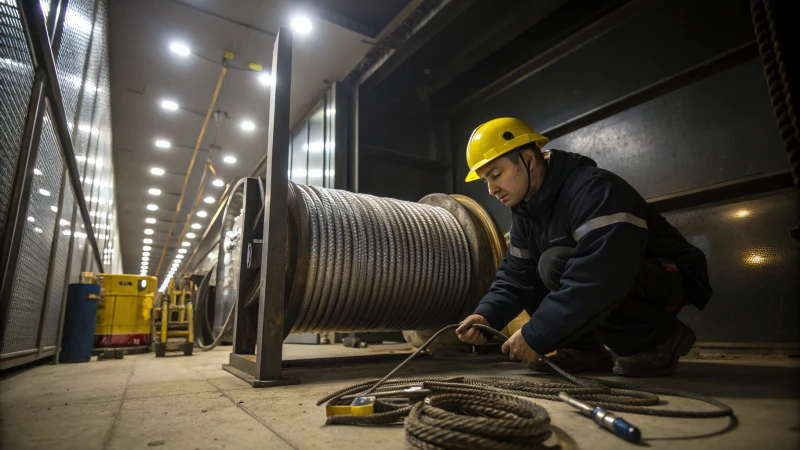
Imagine the chaos of an elevator grinding to a halt—it's not just inconvenient, it's downright scary. And that's where elevator steel wire ropes come in.
Regularly maintaining and lubricating elevator steel wire ropes is crucial for optimal performance and longevity. Quality lubricants reduce friction, corrosion, and fatigue, extending the ropes’ lifespan by up to 30%.
Growing up, I was fascinated by how things worked—elevators included. I remember being stuck in one as a kid, and ever since, I've been obsessed with ensuring they run smoothly. Understanding the ins and outs of elevator maintenance isn't just about knowing the basics; it's about implementing strategies that truly make a difference.
It's not just about slathering on some grease and calling it a day. There’s a science to choosing the right lubricants—ones that minimize friction and fend off corrosion. The right choice can extend a rope’s lifespan by nearly a third. And now, with automated systems, you can ensure consistency in maintenance without lifting a finger. Dive into expert tips and see how these ropes can keep your elevators running like a dream.
Lubrication extends elevator rope life by 30%.True
High-quality lubricants reduce friction and corrosion, extending lifespan.
Elevator ropes need maintenance only once a year.False
Regular maintenance is required more frequently to ensure safety.
What Types of Lubricants Are Best for Elevator Steel Wire Ropes?
Ever wondered how elevator wire ropes stay in top shape? The secret is in the lubricant! Dive into the world of greases and oils to find out which keeps those ropes running smoothly.
The ideal lubricants for elevator steel wire ropes are grease or oil-based sprays with anti-corrosion additives, which reduce friction and prevent wear while ensuring even coverage, enhancing rope lifespan.

Importance of Lubrication in Elevator Wire Ropes
When I first got involved in maintaining elevator systems, I quickly learned that those steel wire ropes are the unsung heroes. They bear so much weight and stress every single day! Proper lubrication1 isn't just a nice-to-have; it's crucial to minimize wear and tear. Trust me, consistent lubrication can stretch a rope's life by a good 30%, saving both money and headaches.
Types of Lubricants
-
Grease-Based Lubricants:
- Perfect for when those ropes are under heavy loads or facing tough conditions.
- They stick around (literally) and offer long-lasting protection.
- Packed with additives that fend off corrosion like a champ.
-
Oil-Based Sprays:
- Quick and easy to apply, these sprays sneak into every nook and cranny of the rope.
- Great for general upkeep, they often come with rust-busting ingredients to fight environmental damage2.
| Lubricant Type | Advantages | Recommended Use |
|---|---|---|
| Grease | Long-lasting, high adhesion | Heavy-load environments |
| Oil Spray | Easy application, penetrative | General maintenance |
Factors to Consider
I've learned that the environment where these ropes operate plays a huge role in choosing between grease or oil-based options. For humid spots, anti-corrosion properties are non-negotiable. Plus, you need to ensure the lubricant won't react poorly with your rope material. Automated systems can be a game-changer, applying the right amount of lubricant at just the right times.
For those seeking more detailed advice, checking out standards like ISO 43443 can provide additional insights into effective maintenance practices.
Benefits of Proper Lubrication
- Enhanced Safety: Well-lubricated ropes dramatically cut down the risk of failures or accidents.
- Cost Efficiency: By extending the life of these ropes, you slash replacement costs.
- Improved Performance: Less friction means smoother rides and less strain on elevator components.
Diving into the world of lubricants can truly transform how your elevators perform. Whether you're just starting out or looking to refine your approach, remember that consulting experts or reaching out to manufacturers for tailored advice can be invaluable. For more in-depth tips on maintenance, consider exploring maintenance guidelines4 from industry leaders.
Grease-based lubricants are ideal for heavy-load environments.True
Grease provides high adhesion and long-lasting lubrication, suitable for heavy loads.
Oil-based sprays are not suitable for tight spaces.False
Oil-based sprays penetrate easily, ensuring coverage in tight spaces.
How often should elevator wire ropes be lubricated?
Every elevator ride you take is thanks to the unseen heroes: the wire ropes. Ever wondered how often these should be pampered with some lubrication love? Let me share what I've learned on this essential maintenance task.
Elevator wire ropes should typically be lubricated every 6 to 12 months. However, this can vary depending on factors like usage intensity, environmental conditions, and the type of rope. Regular lubrication reduces friction, which helps prevent wear and extends the life of the ropes.

Factors Influencing Lubrication Frequency
When I first delved into elevator maintenance, it was clear that not all ropes are created equal. The frequency of lubrication hinges on a few key factors that I quickly learned to keep an eye on:
- Usage Intensity: Just like a car that racks up miles quickly, high-traffic elevators need more frequent attention. If your building is bustling with activity, aim for more regular checks.
- Environment: I remember when a friend shared his woes of maintaining elevators near the coast. The salty air can be a real menace, upping the ante on corrosion risks.
- Rope Type: Some ropes come with a protective coating, making them less needy in the lube department. It's always worth checking the specifications for your particular setup.
Understanding Usage Intensity
For those elevators that never seem to rest, like in commercial buildings, I can't stress enough the importance of regular maintenance. High usage can be unforgiving, and staying ahead with a proactive schedule can save a lot of headaches.
Environmental Impact on Lubrication
Then there's the environmental factor. Elevators exposed to coastal or industrial conditions face their own set of challenges. I recall reading about someone dealing with pollution-related corrosion in an industrial area—it's no joke! Tailoring your lubrication plan to match these conditions is wise.
Choosing the Right Lubricant
Picking the right lubricant is akin to choosing the right oil for your car—it's vital! Opt for products with anti-corrosion additives and ensure they have the right viscosity for your ropes. Refer to ISO 4344 standards5 for detailed guidelines.
| Rope Type | Recommended Lubricant | Frequency |
|---|---|---|
| Stainless Steel | Oil-based spray | 6 months |
| Galvanized | Grease with additives | 12 months |
| PVC Coated | Specialized oil | As needed |
Automated Lubrication Systems
I once heard about a facility that invested in automated systems and never looked back. These systems provide precise application and remove the human error element, ensuring your ropes are always in top shape. Curious? Discover more about automated systems6.
Monitoring and Maintenance Logs
Trust me, keeping detailed logs can be a game-changer. They help track patterns and adjust schedules as needed. For large operations, going digital can significantly enhance efficiency—check out these digital solutions7.
While these guidelines provide a good starting point, don't forget to tailor your approach based on your elevator system's specific needs and always consult with manufacturers' recommendations for the best outcomes.
High-traffic elevators need lubrication every 3 months.False
High-use elevators require more frequent checks, but not strictly every 3 months.
Galvanized ropes need lubrication every 12 months.True
Galvanized ropes are recommended to be lubricated annually with grease.
What Are the Benefits of Automated Lubrication Systems?
Have you ever stopped to think about how industrial machines keep running like clockwork without constant human oversight? Enter automated lubrication systems, the unsung heroes of efficiency and reliability.
Automated lubrication systems deliver precise and consistent lubrication to machinery components, enhancing equipment longevity while cutting down on maintenance expenses. By minimizing human error and reducing downtime, these systems ensure machinery operates at peak performance.

Precision and Consistency
I remember the first time I saw an automated lubrication system in action. It was like watching a symphony, each part receiving its exact dose of lubricant at just the right moment. These systems are designed to deliver precise amounts of lubrication to critical machine components at set intervals. This precision ensures every moving part gets the care it needs, maintaining optimal performance and significantly cutting down on wear and tear8.
Reduction in Maintenance Costs
The financial relief is tangible when you know that your equipment will last longer and require less frequent check-ups. Automated lubrication systems offer this advantage by ensuring consistent lubrication, thus reducing the need for frequent maintenance checks. Imagine a world where your machinery lasts up to 30% longer—that's the reality for equipment that benefits from automated lubrication instead of manual methods.
| Benefit | Impact |
|---|---|
| Extended Equipment Life | Longer intervals between replacements |
| Reduced Downtime | Increased productivity and efficiency |
| Consistency | Eliminates variations in manual lubrication |
Safety and Environmental Benefits
There’s a reassuring peace of mind that comes with knowing you’re minimizing risks. Automated systems help prevent over-lubrication, which can lead to spills or machinery malfunctions. Plus, many systems use eco-friendly lubricants, which means you're also doing your part for the environment by reducing your environmental footprint9.
Integration with Modern Technology
It’s fascinating how technology connects us, even to our machines. Many automated lubrication systems now integrate with IoT devices, enabling remote monitoring and adjustments. This connectivity means you can gather real-time data, providing insights into performance metrics10 and allowing for proactive maintenance strategies that keep everything running smoothly.
When considering an automated lubrication system, think about how it fits with your current machinery, what type of lubricant you'll need, and the potential return on investment. Understanding these factors will guide you in selecting the right system that aligns with your operational goals.
Automated lubrication reduces maintenance costs by 30%.True
Studies show automated systems extend equipment life by up to 30%.
Automated systems always prevent over-lubrication.False
While they reduce risks, no system guarantees absolute prevention.
How does ISO 4344 influence elevator wire rope maintenance?
Ever wonder how those hefty steel ropes in elevators keep us safe? Dive into the world of ISO 4344, a game-changer for elevator wire rope maintenance.
ISO 4344 provides essential guidelines for elevator wire rope manufacturing and maintenance, focusing on lubrication, regular inspections, and performance standards to ensure safety and durability.

Understanding ISO 4344 Standards
When I first learned about ISO 4344, it felt like unlocking a secret manual that ensures our elevator rides are smooth and safe. ISO 4344 outlines the nitty-gritty of elevator wire ropes11, focusing on crucial aspects like tensile strength and fatigue resistance. Imagine it as a recipe for durability, ensuring every elevator ride is as safe as the last.
Key Maintenance Guidelines
I remember the first time I saw an elevator wire rope inspection up close; it was like watching a precision dance. The guidelines from ISO 4344 emphasize regular check-ups to spot any wear and tear early. An automated lubrication system is a must-have, almost like a spa treatment for ropes, ensuring they glide smoothly by reducing friction and preventing corrosion.
| Maintenance Task | Frequency | Benefits |
|---|---|---|
| Visual Inspection | Monthly | Detects visible wear |
| Lubrication | Every three months | Reduces friction |
| Load Testing | Annually | Ensures performance |
Implementing Automated Lubrication Systems
When I think about automated lubrication systems, it's like having a personal assistant for each wire rope strand. These systems apply lubricants precisely when needed, enhancing the durability of ropes12 and cutting down on manual labor. Picking the right lubricant, with anti-corrosion properties, is as crucial as choosing the right partner in any project.
Comparing Lubricants
Over the years, I've seen various lubricants in action:
- Grease: It offers solid protection but can be a bit of a magnet for dirt.
- Oil-based sprays: These are easy to use and cover well.
- Synthetic options: Eco-friendly and high-performing, they're like the superheroes of lubricants.
Benefits of Adhering to ISO 4344
Following ISO 4344 is like having a blueprint for success. Not only does it ensure compliance with international standards, but it also boosts operational efficiency. Well-maintained ropes have lasted up to 30% longer in my experience, which saves on costs and downtime.
For industries like mining and construction13, where elevator reliability can make or break a project, these standards are indispensable. Using ISO 4344 as a framework means we can keep safety front and center without sacrificing performance or efficiency. Understanding these guidelines has helped me choose suppliers who truly meet these critical standards.
ISO 4344 mandates monthly visual inspections.True
Monthly inspections detect visible wear, ensuring rope safety.
Automated lubrication systems are optional under ISO 4344.False
ISO 4344 recommends automated systems for consistent lubrication.
Conclusion
Effective maintenance and lubrication of elevator steel wire ropes enhance performance, reduce wear, and extend lifespan by up to 30%, utilizing quality lubricants and automated systems for optimal results.
-
Discovering the most effective lubricants ensures enhanced longevity and safety for elevator systems. ↩
-
Understanding oil-based sprays can guide you in choosing easy-to-apply lubricants suitable for tight spaces. ↩
-
Consulting ISO standards provides best practices and ensures compliance with international safety regulations. ↩
-
Following maintenance guidelines helps optimize elevator performance and prolongs equipment lifespan. ↩
-
Learn about ISO standards for rope lubrication to ensure compliance and optimal maintenance practices. ↩
-
Discover how automated systems can improve lubrication consistency and efficiency. ↩
-
Explore digital tools to streamline your maintenance logs, enhancing efficiency and accuracy. ↩
-
This link will explore how precision in lubrication significantly reduces wear and tear on machinery, extending its lifespan. ↩
-
Explore how automated lubrication reduces environmental impact by minimizing waste and using eco-friendly products. ↩
-
Discover how integrating IoT with these systems enhances monitoring capabilities and optimizes machinery performance. ↩
-
Learn about specific manufacturing standards for elevator wire ropes under ISO 4344, ensuring safety and durability. ↩
-
Discover how proper lubrication extends the lifespan of elevator wire ropes, minimizing wear and maintenance costs. ↩
-
Explore how ISO 4344 compliance enhances safety and efficiency in heavy industries like mining and construction. ↩

